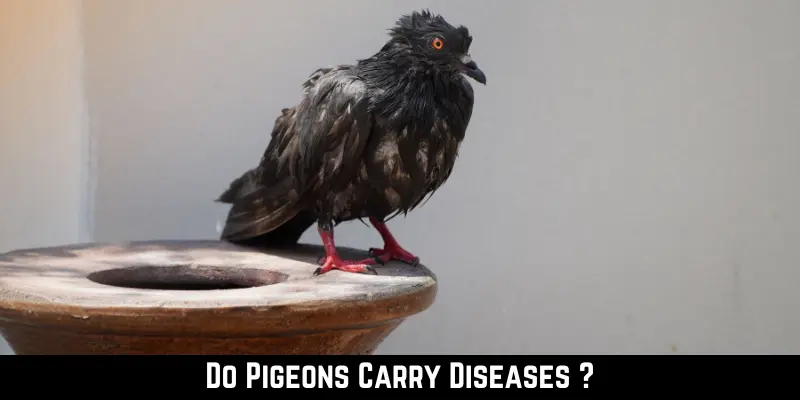Pigeons are elegant medium-sized birds. People enjoy feeding these birds; many keep them as a pet. However, this gorgeous bird is blamed by many for carrying the disease and infection. Few people even label it as rats with wings or worse than rats. Therefore, the question arises do pigeons carry diseases?
Yes, pigeons carry diseases. They are the carriers of several different diseases. The most common diseases spread through pigeons are histoplasmosis, candidiasis, cryptococcus, and salmonella. These diseases are transmitted through pigeon dropping and can be life-threatening if left untreated. Additionally, pigeons can also carry ectoparasites which can infest homes.
It is rare to get infected from pigeon-related diseases but not impossible. However, these diseases are not transmitted by simply feeding the pigeons. Read the article till the end and learn about all the microorganisms pigeons carry. Plus, tips and tricks to get rid of diseases.
Which Type Of Diseases Do Pigeons Carry?
According to the research, pigeons carry almost sixty different types of diseases. The fungal infections that are most common among the pigeon population; are candida, Histoplasma, and cryptococcus. The most common bacteria it carries in its digestive system is E-coli, and the most famous virus is bird flu and West Nile virus.
The disease that pigeons carries can destroy the pigeon’s health. Some birds are strong enough to fight against them, while younger birds can die from the infection. Even though pigeon carries numerous diseases but the population of pigeons is not affected by this.
The most common diseases pigeons might carry; are mentioned in detail below.
Histoplasmosis
It is a fungal disease caused by a fungus called Histoplasma. The bird excreta contain Histoplasma. However, it is rare for a pigeon to get an infection with this fungus. The fungus grows in the environment, especially in the damp soil with a heap of bird droppings.
Cryptococcus
Cryptococcus is also a fungal disease caused by cryptococcus neoformans. Pigeons carry this fungus in their digestive system and release it in their droppings.
E-coli
E-coli is a gram-negative bacterium. It is one of the most common bacteria that birds carry. E-coli thrives in the pigeon digestive tract; there are numerous different types of E-coli found inside the pigeon gut.
Salmonella
Salmonella bacteria live inside the birds’ digestive system. Pigeons shed bacteria in their dropping. Salmonella can cause infection in pigeons, called paratyphoid.
Candidiasis
Candidiasis is a fungal infection; caused by a yeast called candida. Birds and other domestic animals carry candida in their intestine. The pigeon shed the yeast in its dropping.
Psittacosis
Psittacosis is also known as parrot fever as it mainly infects pigeons and related species. Psittacosis is caused; by the bacteria C.psittaci. It causes infection in birds and can spread from birds to humans.
Encephalitis
Pigeon protozoal encephalitis causes nervous system infection in pigeons. It is caused; by the parasite Sarcocystis Calcasieu.
Encephalitis spreads from hawks to pigeons. Encephalitis can transmit from one pigeon to another via the same water source.
Bed Bugs
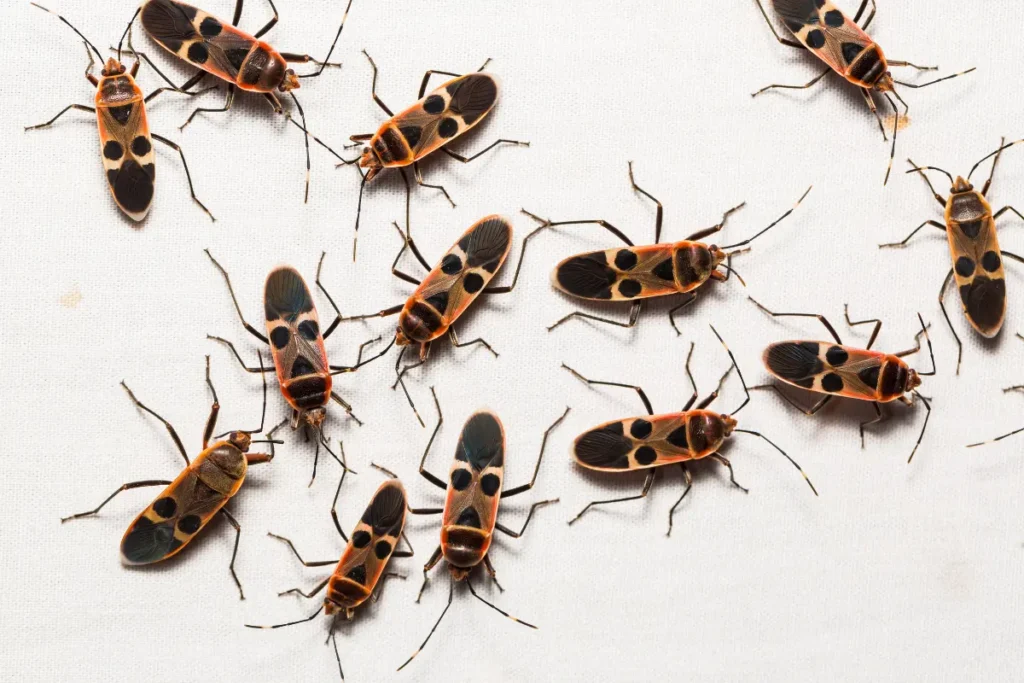
Bed bugs are small, thick, and brown. The size of bedbugs is five to seven millimeters long. Bed bugs are a parasite that depends on their host for nutrients. They belong to the Latreille family. They thrive in birds’ nests, and adult bed bugs attach themselves to the pigeon. Bedbugs suck pigeon blood and live on its body until it finds another host.
To find more detail about bed bugs, read the article: do pigeons carry bed bugs?
Fleas
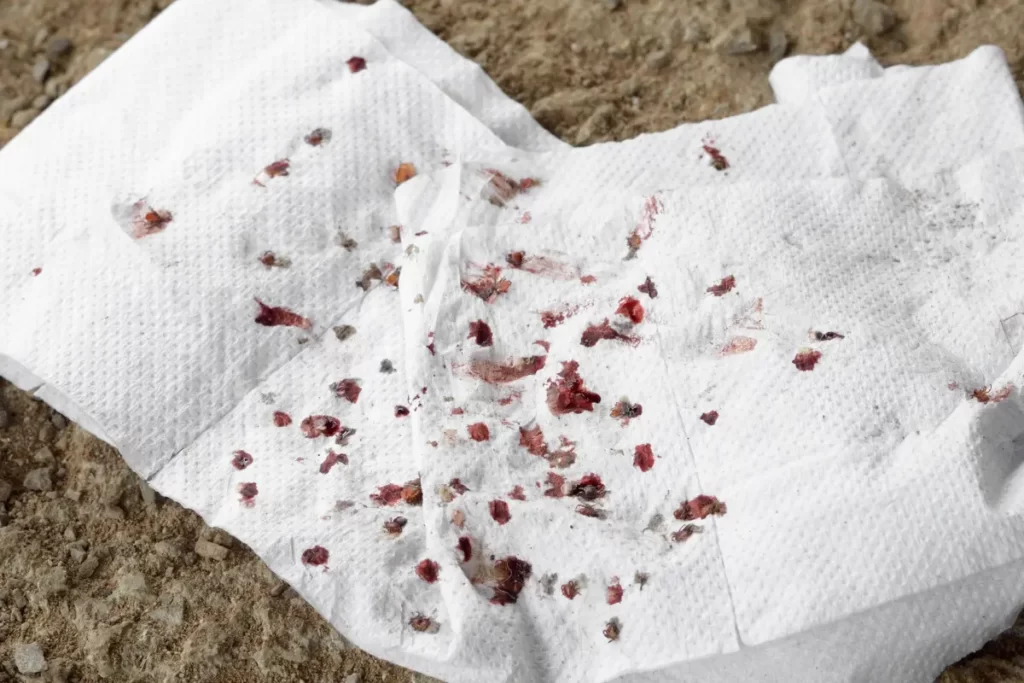
Fleas belong to the family Culicidae. They are the most common parasite found in birds. Fleas also survive on the pigeon’s blood.
Fleas are dark reddish-brown and are one to three millimeters long. To find more detail about pigeons carrying fleas, read my previous article on do pigeons carry fleas?
Ticks
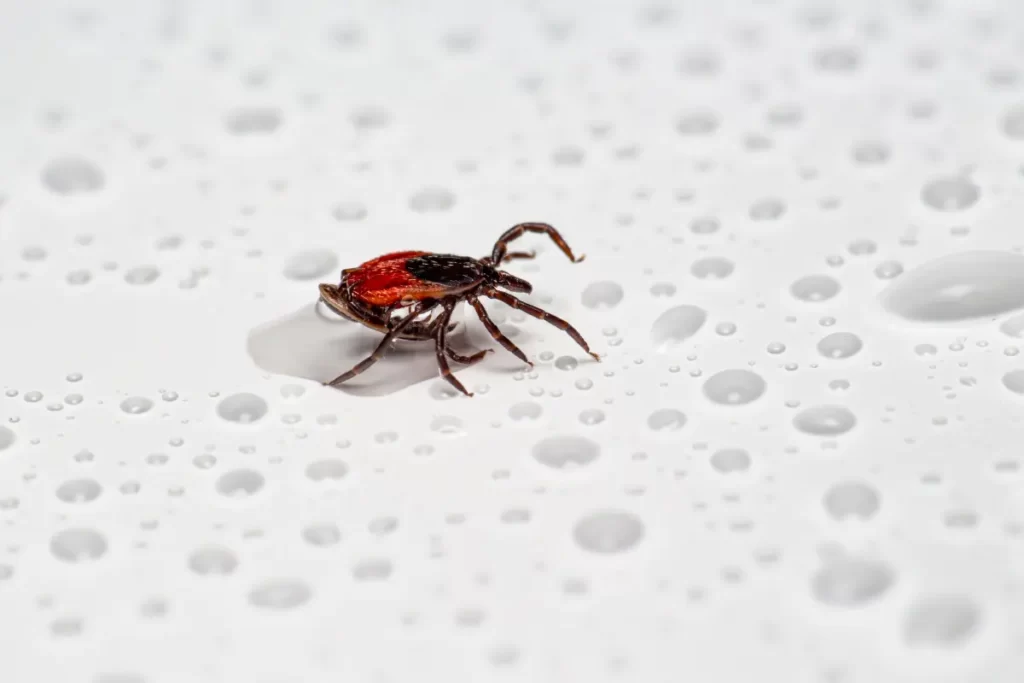
Ticks are the most common blood-sucking organism found on pigeons. They belong to Arachnida and are similar to mites. They are brownish and six-to-eight-millimeter wide and one to two millimeters thick. Read my previous article on do pigeons carry ticks.
Bird flu
Bird flu infects many birds, including pigeons, chickens, and doves. Bird flu is caused; by the type A influenza virus. When infected with the avian virus, the pigeon will shed the virus in its dropping. Read my previous article on do pigeons carry bird flu.
Sources Of Pigeon Diseases
Many things can cause infection in pigeons. Pigeons living in the wild are more vulnerable to diseases than pet pigeons. However, pet pigeons can get infected too. Pet pigeons mostly get infected by parasites. Pigeons can get sick from infected food or water or the disease transmitted by another organism.
Infected Feed
The most common source of disease in pigeons is infected feed. You must provide good quality and nutritious food to the pet pigeons for their health. The most common diseases transmitted through food sources: coccidiosis, worms, mycoplasmosis, salmonellosis, E-coli, Hexamitiasis, necrotic enteritis, and colibacillosis.
The diseases transmitted from the infected feed usually cause diarrhea in the pigeon. If not treated on time, it can cause severe dehydration and kill the bird.
Infected Water
Pigeons can get infected with the disease when they drink from an infected water source. The most common source of infection in the wild and the pet pigeons is infected water. To avoid this, ensure that you provide fresh and clean water to the pigeons.
If you place water in the bird feeder in your yard for pigeons, make sure other animals do not drink from that as it can be the carrier of any disease that can transmit to the bird. The ponds are also the source of the microorganisms that carry diseases.
The common infection transmitted via water is Trichomoniasis, mycoplasmosis, Salmonellosis, E-coli, Hexamitiasis, and colibacillosis.
Air Particles
Air droplets consist of numerous microbes which can cause infection in birds. The diseases enter the pigeon circulatory system via inhalation and cause infection. The disease found in the air is ornithosis which can infect pigeons.
Bird To Bird Transmission
The diseases can transmit from one bird to another. Sometimes diseases spread from one bird species to another bird species, such as bird flu and encephalitis. Encephalitis spread from hawks to pigeons.
In some cases, the microbes in pigeons are transmitted from parents to offspring, for example, ornithosis. Ornithosis can spread from beak to beak in pigeons.
Feces
The feces of any organism consist of numerous bacteria and other microbes. If a pigeon sits on feces or drinks water from the source, which is full of scats can get infected. The diseases transmitted from feces are Salmonellosis, mycoplasmosis, hexameters, necrotic enteritis, and colibacillosis.
Environment
Many parasites living in the environment can attach themselves to the pigeon when they lost their natural habitat. The most common are mites, ticks, fleas, and bed bugs. Almost all of them survive on pigeon blood resulting in anemia in the bird.
Pigeon Diseases And Symptoms
Common pigeon diseases and their symptoms are explained; in detail below.
E-coli Symptoms
E-coli will weaken the immune system of the pigeon. It is the most dangerous disease and can even kill the bird. It will not be wrong to say E-coli is the AIDS of the pigeon. According to the 2015 medical journal, E-coli in the pigeon gut has an antibiotic resistance gene.
Out of hundred E-coli strains obtained from pigeon gut, eighty-five strains were resistant to one or more antibiotics, and fifteen were sensitive to all the antibiotics tested.
The most common symptoms observed in pigeons with E Coli are; coughing, depression and stress, audible breathing sound, anorexia or anorexia, and ruffled or ruffled feathers.
Salmonellosis Symptoms
Pigeons infected with salmonella will suffer from severe weight loss, decreased appetite, and diarrhea. Additionally, pigeons will not have enough energy to fly and will limp.
Coccidiosis Symptoms
Coccidiosis causes food poisoning in the pigeon. Symptoms of coccidiosis are severe watery or bloody diarrhea which can contain green mucus. Pigeon will become weak and will be inactive. Plus, the bird will also suffer from loss of appetite, weight loss, and depression.
Trichomoniasis Symptoms
Trichomoniasis can cause sudden death in pigeons. It impacts the back of the throat and the gullet of the pigeon, causing extreme discomfort in breathing and eating. Pigeon will have anorexia as it is not able to swallow food.
Apart from these symptoms, pigeons can drool saliva. Pigeons will also have a hard time standing and flying. In extreme cases, the pigeon will not be able to close its mouth as the esophagus swell.
Fleas Symptoms
The flea lives on pigeons’ bodies and causes anemia. The flea infestation will cause pigeon feathers to turn pink, and birds will become weak. In extreme cases, the pigeon can show feather-destroying behavior to fight the irritation caused by the insects.
Ticks Symptoms
The ticks reside on pigeon feathers causing skin flaking or dermatitis. The mature pigeon can handle them, but the baby pigeon will die with the tick’s attack.
Psittacosis Symptoms
Pigeons suffering from psittacosis or parrot fever will have a poor appetite, green or yellow droppings, and poor appetite. Other symptoms include discharge from the nose or eyes, weakness, and poor appearance.
Worms Symptoms
Worms can find their way to the pigeon intestine through infected food or feces. Pigeons can eat the worm imagining it as a food that can cause infection; once it is inside the gut.
The common symptoms pigeon-carrying worms shows are weight loss, diarrhea, loss of appetite, weakness, inability to fly, low energy, and inactivity. Pigeons carrying worms in the gut will shed them in their droppings.
Ornithosis Symptoms
It is a hidden infection that weakens the immune system of the bird. It also affects the lungs of the pigeon. They will have difficulty breathing; there will be loud audible breathing noise, nasal dropping, and fluid discharge from the eyes.
Pigeon will also suffer from diarrhea, weight loss, depression, and fever. Ornithosis can cause conjunctivitis in pigeons.
Mycoplasmosis Symptoms
Mycoplasmosis causes disease of the lungs in pigeons. It specifically affects the bronchi causing difficulty in breathing. The infected pigeon will have nasal discharge, lack of activity, wheezing breath sounds, throat inflammation, swollen or puffy eyelids, and severe cough.
Colibacillosis Symptoms
Colibacillosis weakens the immune system of pigeons and causes swelling in almost all the body parts of pigeons. The symptoms include; difficulty in breathing, standing, and flying. Pigeon health will also have rapid weight loss.
Necrotic Enteritis Symptoms
Enteritis causes watery or bloody diarrhea in pigeons. Other symptoms include ruffled feathers, a humped back, and depression. The disease can kill the bird if left untreated.
Hexametasis Symptoms
The symptom of hexametric is yellow watery diarrhea, weight loss, and dry ruffled feathers. Due to extreme diarrhea pigeons suffer from anorexia and weight loss and become inactive.
Candidiasis Symptoms
Pigeons suffering from candidiasis will have lethargy, disoriented feathers, decreased appetite, and severe vomiting. Additionally, pigeons will also have constipation, and the crop will be full of mucus and other debris.
Bird flu Symptoms
Bird flu or avian virus will impact the nervous system of the bird. The symptoms include a swollen head, discoloration of the body, and the combs and waffles turning blue, plus lack of appetite, difficulty in breathing, diarrhea, and decreased egg formation.
Do Wood Pigeons Carry Disease?
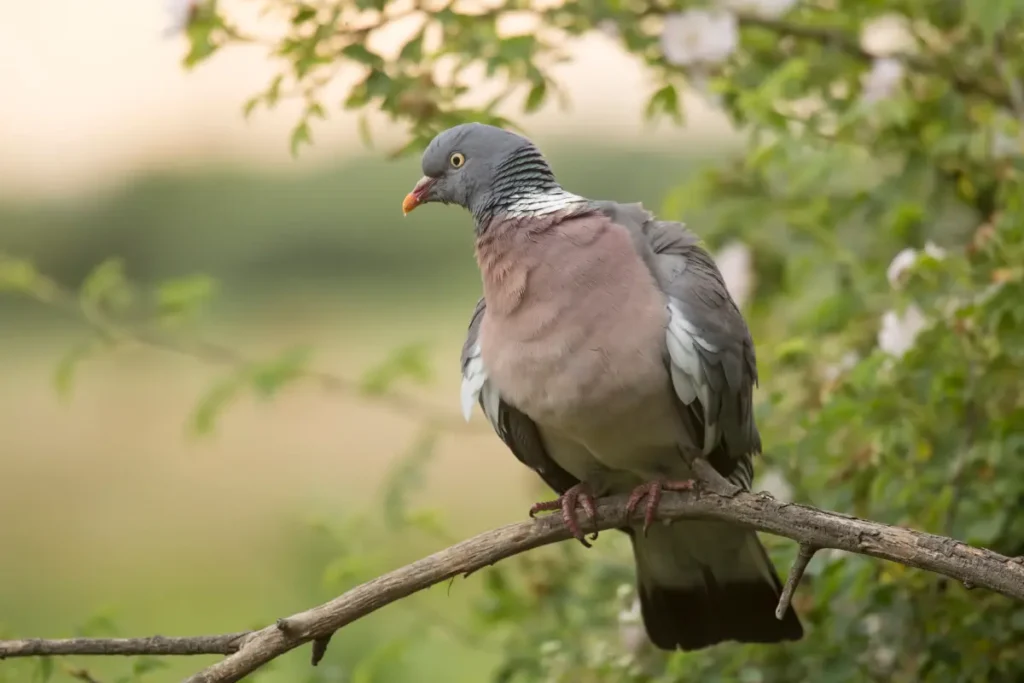
Wood pigeons carry diseases. It is estimated around seventy-five percent of wood pigeons carry diseases. However, wood pigeons do not transfer diseases to humans. Mainly they bring viruses, research of 201l states that there are four novel viruses found in wood pigeons.
Out of four, two of those viruses belong to the Astroviridae family. Other than viruses, wood pigeons also carry bacteria, fungi, and pesticides. They transfer similar microorganisms to city or feral pigeons. Wood pigeons also shed multiple microbes in their dropping.
Do City Pigeons Carry Diseases?
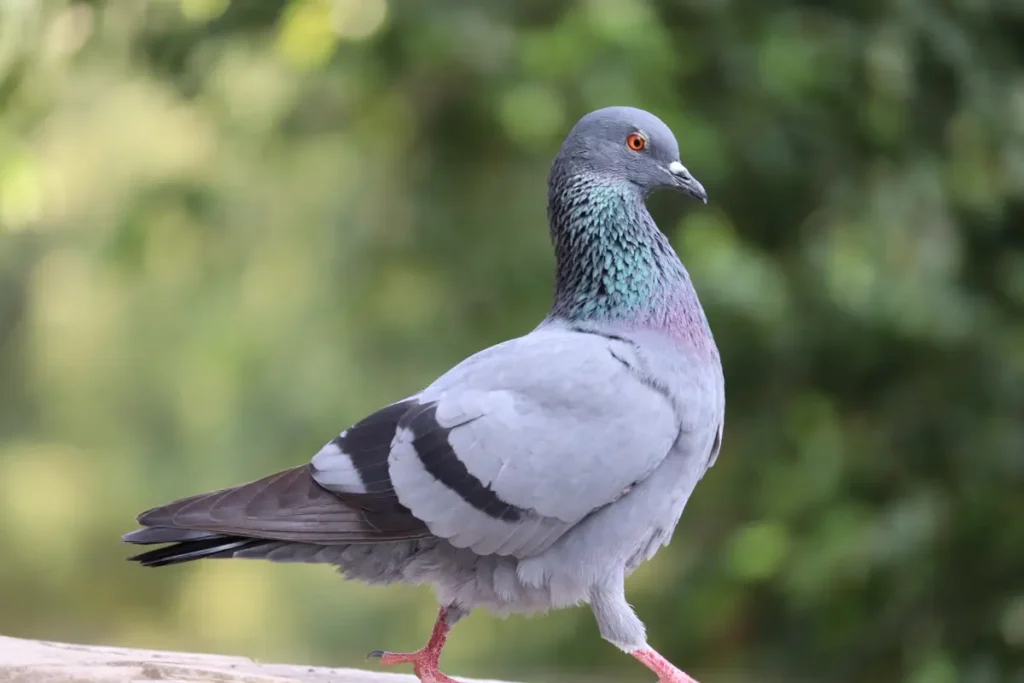
City pigeons carry diseases, and the risk of transmission of diseases to humans in the city is comparatively higher. The increase in the pigeon population is alarming in urban settings.
Pigeon breed twice or thrice a year in urban areas because feed is abundant. Pigeons will breed more when there is more food.
Pigeons residing in cities build their nest on the rooftop of homes, in a chimney, or in the vent. The pigeon nest is also a carrier of multiple pesticides which can invade residences.
The pigeon scats when it dries and turns into fine dust particles. People can inhale the microbes from pigeon scat from the air resulting in infection.
Do Wild Pigeons Carry Diseases?
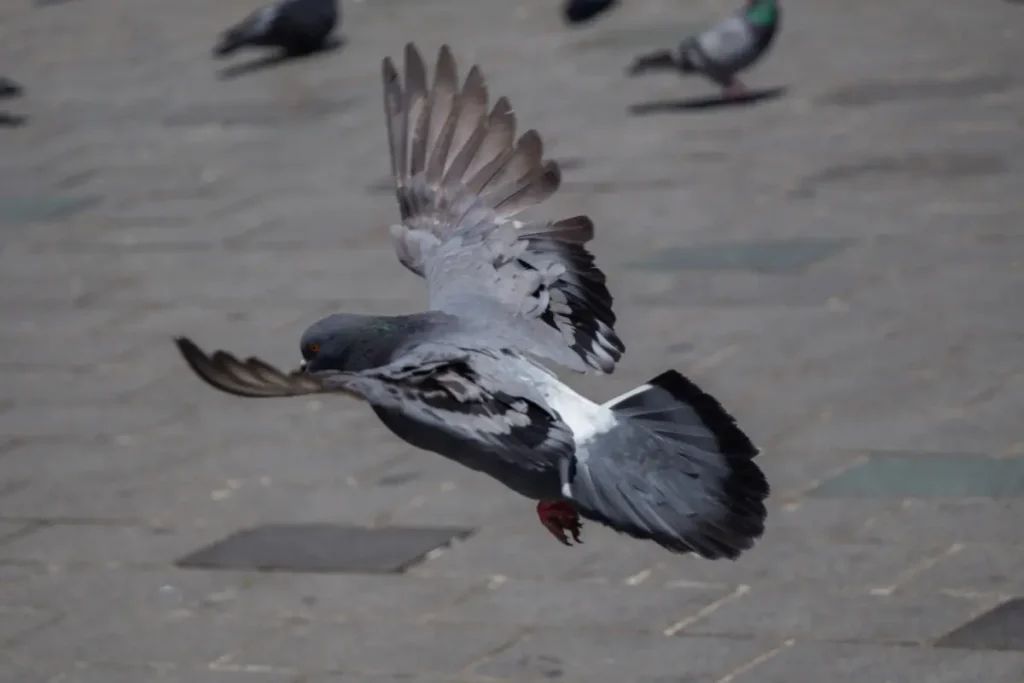
Wild pigeons carry diseases. They can get infected by other birds and water sources. In some cases, birds only carry diseases but do not show any symptoms. The birds living in nature have a higher chance of carrying disease. The microbe might not cause any illness in pigeons, but when transmitted to another organism, it can cause severe infection.
Do Domestic Pigeons Carry Diseases?
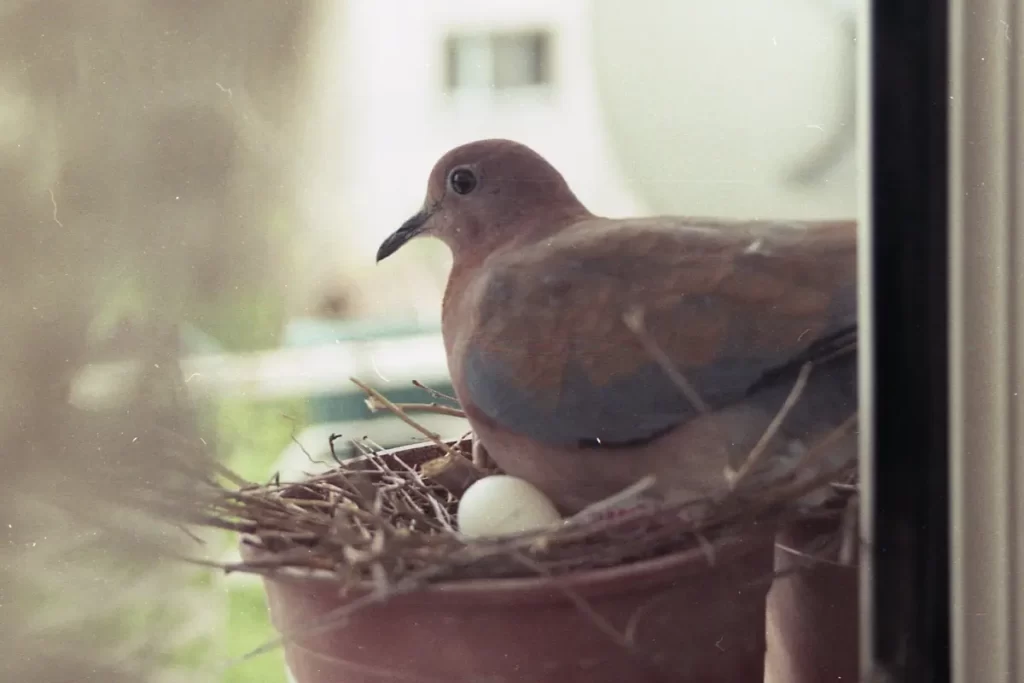
Many people keep pet pigeons, they are fun and gorgeous bird to keep. Pet birds or domestic birds can carry diseases. Domestic pigeons might carry fewer diseases than wild pigeons.
However, they do shed the microbes in their dropping. The domestic pigeon can get infected by parasites as well.
Do Dead Pigeons Carry Diseases?
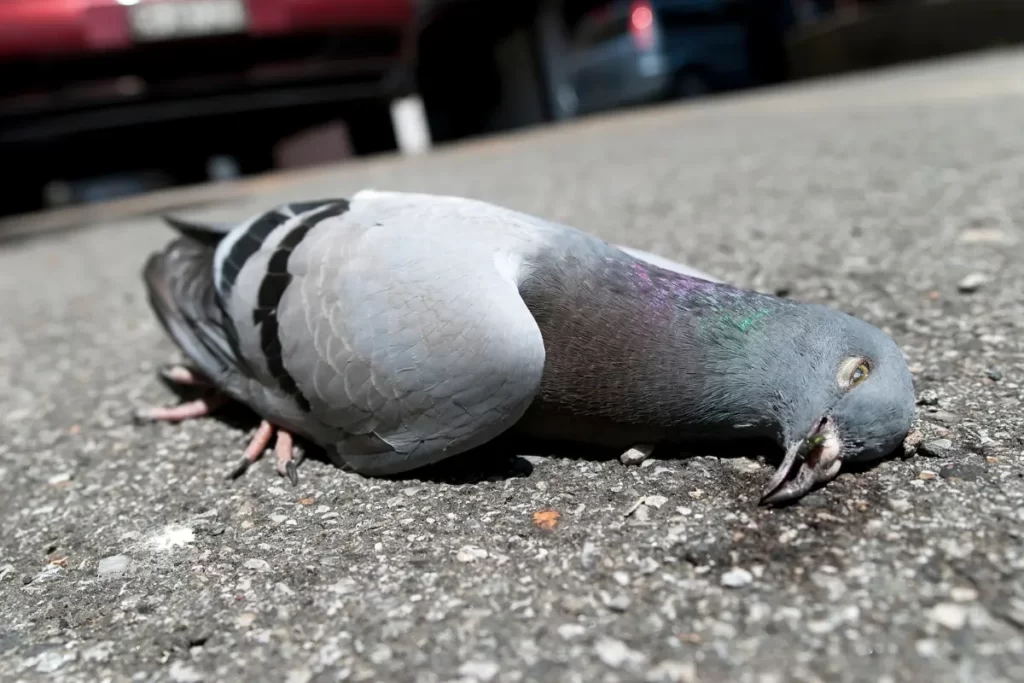
Many microbes will thrive on dead pigeons. Eco parasites will move in search of another host, but bacteria and fungi will continue growing on the dead pigeon. People who touch the expired bird can get infected with salmonella. Make sure that you wear rubber gloves while disposing of dead pigeons.
Do Pigeons Carry More Diseases Than Rats?
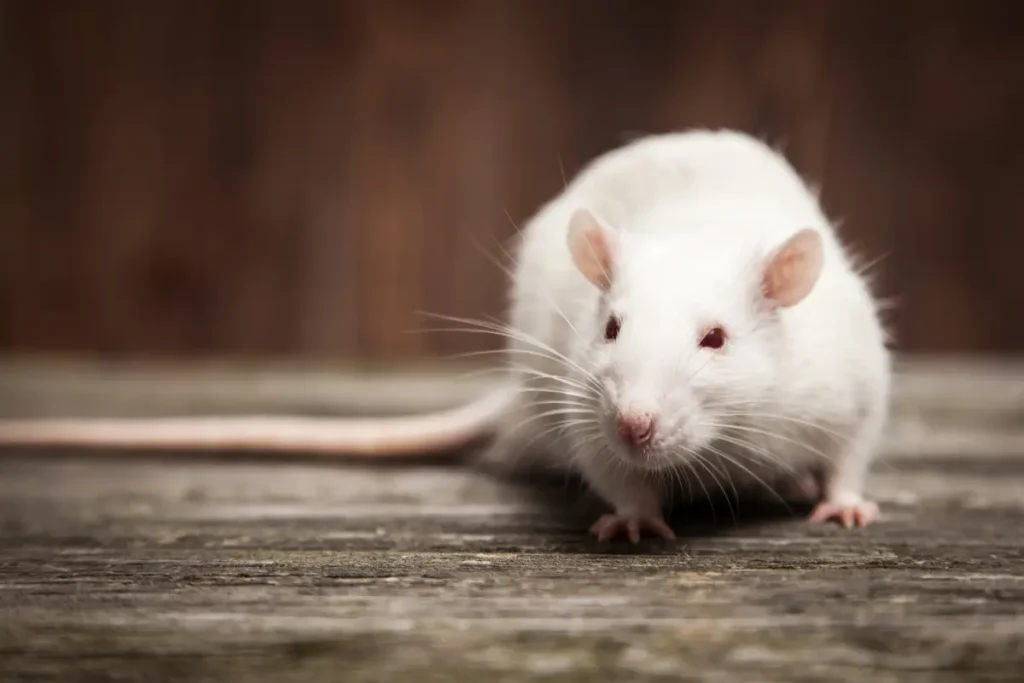
Pigeons carry several diseases, even more than rats. Pigeons shed disease-causing organisms in their dropping.
Most of these diseases cause microbes to live inside the pigeon gut. They might not show symptoms in healthy pigeons but can kill weak pigeons.
Pigeons, apart from bacteria, fungi, and viruses also carry parasites that are dangerous to the bird itself and humans and other domestic animals.
Research states that pigeons bring more than sixty different types of diseases. Some people call pigeons rats with wings.
Can Pigeons Transmit Diseases To Cats And Dogs?
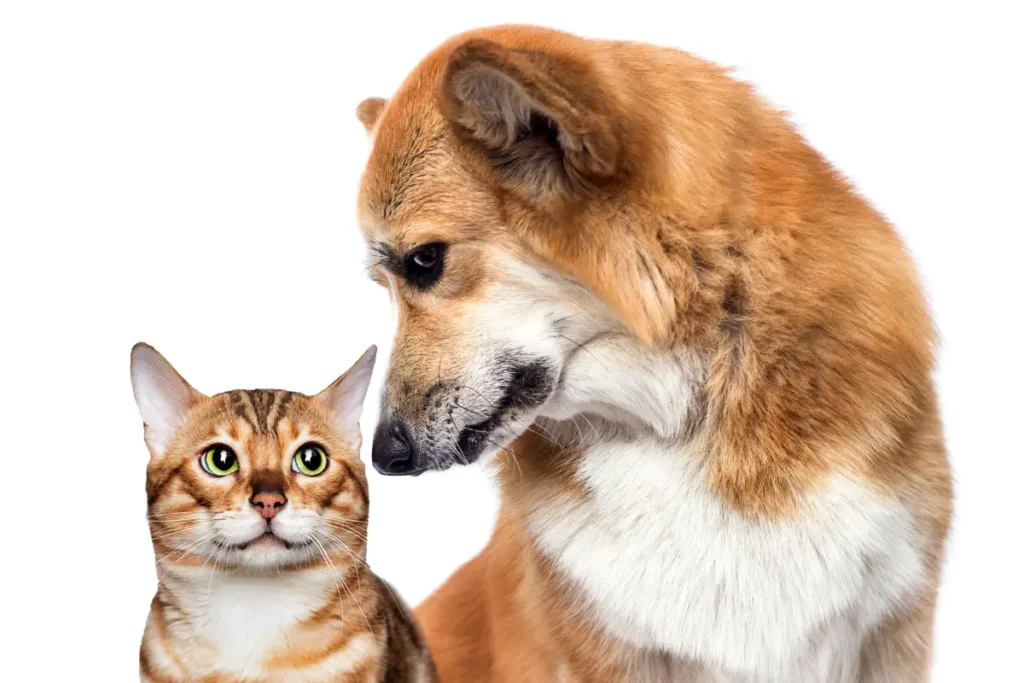
Pigeons can transmit diseases to domestic animals like cats and dogs. Pigeons carry numerous types of bacteria and fungi which can infect cats and dogs. Chlamydiosis, histoplasmosis, and salmonella are three diseases that can severely impact cats and dogs.
The pigeon shed the bacteria and fungi in its dropping. The pigeon scat dries and turns into dust particles which can transfer disease to the animals via inhalation. The most common symptom among cats and dogs is vomiting and diarrhea when infected.
Pigeons can transmit parasites to domestic animals. The parasites like lice and mites live on pigeon bodies. A wild or domestic pigeon can transfer these insects to cats and dogs.
Can Pigeons Transmit Diseases To Humans?
Pigeons harbor numerous microorganisms which can infect humans. Pigeons transfer many diseases to humans. Typically, humans can inhale the particles of pigeon scat which contain microbes.
Pigeon is also the source of parasites that infest homes like bedbugs, mites, fleas, and ticks. The ectoparasites living on the pigeon can transfer to the other animal and infest your home. These parasites do not live on humans but can bite them, causing an allergic reaction. The allergic reaction can vary from mild to severe anaphylactic reactions.
What Diseases Can Humans Get From Pigeons?
Humans can get infected with almost all the diseases pigeons carry. A few of the diseases transmitted from pigeons to birds are mentioned below in detail:
Histoplasmosis
It is one of the most common diseases transmitted via pigeon droppings. Typically, it gets inside a human body via inhalation. When cleaning the soil or pigeon droppings’ people can inhale a large amount of fungus.
The fungus enters the respiratory system and causes infection. If left untreated, this disease can spread to other organs as well.
Gardeners and cleaners are at high risk of infection caused by Histoplasma. Typically, symptoms begin after one to three weeks.
Initial symptoms are similar to the symptoms caused by a cold; fever, cough, fatigue, and tiredness. If histoplasmosis is left untreated, it will weaken the immune system over time.
Some infected people can be the carrier of the disease but display no symptoms. However, it does not transfer from one person to another.
Cryptococcus
Cryptococcus is a fungal infection that affects the respiratory and nervous systems. Cryptococcus is one of the most dangerous diseases when it infects humans.
The two sources of cryptococcus are soil and pigeon droppings. The chances of a high-grade infection with cryptococcus are less. It only causes symptoms in people with a weak immune system. The initial symptoms are fever, cough, and chest pain.
E-coli
E-coli is a bacteria found in the environment and birds’ intestines. Pigeons might release this bacterium in their droppings. It usually enters the human body via water.
The pigeon dropping can find its way into a freshwater source. When people consume polluted water, they can get infected. E-coli affects the digestive system causing nausea, vomiting, and diarrhea.
Salmonella
Salmonella is a bacterium that affects the digestive system and causes food poisoning.
When the pigeon scats become dry and turn into dust particles, they can transfer into food sources.
Candidiasis
An induvial can be infected with the yeast when it accidentally touches or inhales the particles of pigeon droppings. This disease only shows symptoms in immunocompromised people.
Psittacosis
They shed the fungus in its dropping. When the pigeon scats become dry, people can inhale the particles and be infected. Psittacosis spreads from animals to humans and from humans to humans as well.
Typically, symptoms will appear within four days to a week. The fungus causes fever, cough, headache, fatigue, tiredness, and pneumonia. Usually, pet owners, pet shop employees, and vets are at the most risk of psittacosis.
Bed bugs
The most aggravating insect to handle is bed bugs. A bedbug can move from one host to another. Therefore, they can infect domestic animals like cats and dogs or other pet birds. The bedbugs are active at night and will bite humans while sleeping. A bed bug bite is similar to a mosquito bite. It will leave rashes and red spots on the skin.
Fleas
The fleas can infest homes and will hide in dark spaces. Fleas do not live on human skin but can bite. They typically bite on the lower leg. Many flea bites can cause severe allergic reactions.
Ticks
Pigeon ticks cannot live on humans, but they can bite. Pigeon ticks can cause a severe anaphylactic reaction in humans. Pigeon nesting materials are also the source of the ticks.
West Nile Virus
The West Nile virus is not transmitted directly from pigeons to humans but via mosquitoes. The mosquitoes carry the disease from infected birds and transfer it to humans.
The virus causes fever, flu, tiredness, body aches, and fatigue. The symptoms can last from days to months, depending on the immune system.
How To Get Rid Of Pigeon Disease
It is necessary to know about common signs and symptoms of pigeon diseases before getting rid of them. To avoid pigeon-associated diseases, you will have to take some measures. I have mentioned a few tips below; read them carefully and solve the problem.
Tip#1
If you own a pet pigeon, there will be specific symptoms when it is sick. Typically, symptoms include anorexia, inactivity, restlessness, diarrhea, ruffled feathers, and in extreme cases, swelling of the body parts. To cure the disease in pigeons, you will have to take the bird to the vet.
Tip#2
The common parasites which invade homes are bed bugs and fleas. The pigeon nest is the source of both of these parasites. If your home is infested with either fleas or bed bugs first step is to find the nest in your house. Once you find the nest wear proper gloves and dispose of it. You must call pest control to help you in this situation.
Tip#3
Another way to get rid of pigeon-associated disease is: you will have to make sure that there is no pigeon in the surrounding of your house. For this, you will have to pigeon-proof your home. Use the tricks given below.
- Install anti-roosting spikes on your rooftops.
- Tie the string all around the area.
- Use a garden hose on the pigeon.
- Spray chili or cinnamon in the area.
- Install reflective surfaces like a mirror or plastic sheets.
Conclusion
By now, you must know all the diseases pigeons carry and their signs and symptoms. Pigeons carry numerous organisms which they can transmit to humans and domestic animals. The sources of pigeon diseases are infected feed, water, and feces of another organism.
Pigeons will show specific signs and symptoms; when it is sick or is infected. Adult pigeons are strong enough to fight diseases, while the younger ones can die from the infection. Even a dead pigeon can be the source of many diseases.
Pigeons shed many microbes in their dropping, which can infect humans. Therefore, it is recommended not to keep them as a pet. While handling pigeon scat, you must wear gloves and a mask.
The disease from pigeon scat is transferred to humans and domestic animals via touch and inhalation. Take the sick pigeon to the pet. If your home is infested with parasites carried by the pigeon, call pest control.
The article discusses a to z about pigeon-related diseases and the tips to tackle them. If you have any more queries, feel free to comment below.
References
How Pigeons Became Rats: The Cultural-Spatial Logic of Problem Animals- Oxford Academic
The carrying pigeons of the cell: exosomes and their role in infectious diseases caused by human pathogens- Oxford Academic
